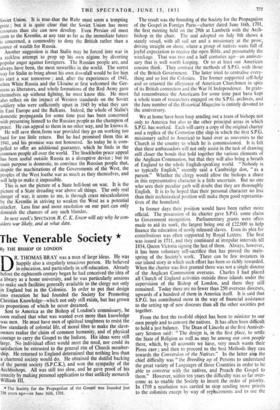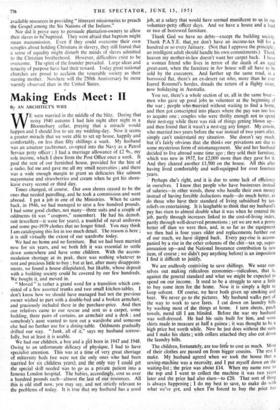The Venerable Society *
By THE BISHOP OF LONDON
DR. THOMAS BRAY was a man of large ideas. He was happily also a singularly tenacious person. He believed in education, and particularly in self-education. Already before the eighteenth century began he had conceived the idea of a library as a home university, and be was particularly anxious to make such facilities generally available to the clergy not only in England but in the Colonies. In order to put that design into execution be had founded the Society for Promoting Christian Knowledge—which not only still exists, but has grown to proportions of which he never dreamed. Sent to America as the Bishop of London's commissary, he soon realised that what was wanted even more than knowledge was men. He must have men of spiritual toughness to resist the low standards of colonial life, of moral fibre to make the slave- awners realise the claim of common humanity, and of physical courage to carry the Gospel to the Indians. His ideas were still large. No individual effort would meet the need, nor could its satisfaction be entrusted to the general rim of Church member- ship. He returned to England determined that nothing less than a chartered society would do. He obtained the dutiful backing cif the parent society (S.P.C.K.), and won the sympathy of the Archbishops. All was still too slow, and he gave proof of his Lenacity by making personal application to that unlikely monarch William III.
*The Society for the Propagation of the Gospel was founded just ,P.50 years ago—on June 16th. 1701. The result was the founding of the Society for the Propagation of the Gospel in Foreign Parts—charter dated June 16th, 1701, the first meeting held on the 29th at Lambeth with the Arch- bishop in the chair. The seal adopted on July 8th shows a stately vessel, with all sail set and a missionary at the prow, driving straight on shore, where a group of natives waits full of joyful expectation to receive the open Bible, and presumably the wreckage. That was two and a half centuries ago—an anniver- sary that is well worth keepipg. Or so at least our American cousins think. They contrast the methods of S.P.G. with those of the British Government. The latter tried to centralise every- thing and so lost the Colonies. The former supported self-help and so retained the allegiance of American Churchmen in spite of its British connection and the War bf Independence. In grate- ful remembrance the Americans for some time past have kept a whole team of researchers engaged on the S.P.G. archives, and the June number of the Historical Magazine is entirely devoted to the anniversary.
We at home have been busy sending out a team of bishops not only to America but also to the other principal areas in, which S.P.G. has worked. Each will carry a copy of the original charter and a replica of the Centurion (the ship in which the first S.P.O. missionary sailed to America) to hand over as souvenirs to the Church in the country to which he is commissioned. It is felt that these ambassadors will not only assist in the task of drawing still closer the bonds that hold together the various elements of the Anglican Communion, but that they will also bring a breath of England to the whole English-speaking world. " Nobody is so typically English," recently said a Cambridge don, " as a parson." Whether the clergy would allow the bishops a share in this representative character is a little uncertain. But no one who sees their peculiar garb will doubt that they are thoroughly English. It is to be hoped that their personal character no less than their ecclesiastical position will make them good representa- tives of the homeland.
In former days their position would have been rather more official. The possession of its charter gave S.P.G. some claim to Government recognition. Parliamentary grants were often made to aid its work, the largest being one of £22,000 to help finance the education of newly released slaves. Even its plea for contributions was often supported by Royal Letters. The first was issued in 1711, and they continued at irregular intervals till 1854, Queen Victoria signing the last of them. Always, however, it has been voluntary self-sacrifice that has proved the main- spring of the Society's work. There can be few instances in our island story in which such effort has been so richly rewarded. When the charter was first granted there was not a single diocese of the Anglican Communion overseas. Charles I had placed all Church of England activities outside these islands under the supervision of the Bishop of London, and there they still remained. Today there arc no fewer than 250 overseas dioceses, upwards of a hundred of them in America itself. It is said that S.P.G. has contributed more in the way of financial assistance to the setting up of new dioceses than all the other societies put together.
From the first the twofold object has been to minister to our own people and to convert the natives. It has often been difficult to hold a just balance. The Dean of Lincoln at the first Annivet- sary Sermon said: " The design is, in the first place, to settle the State of Religion as well as may be among our own people there, which, by all accounts we have, very much wants their Pious care ; and then to proceed to the best Methods they can towards the Conversion of the Natives." In the latter ail)) the chief difficulty was " the Breeding up of Persons to understand the great variety of Languages of those Countries in order to be able to converse with the natives, and Preach the Gospel to them." However, within ten years the difficulty was so far over- come as to enable the Society to invert the order of priority. In 1710 a resolution was carried to stop sending more priests to the colonists except by way of replacemnts and to use the available resources in providing " itinerant missionaries to preach 'the Gospel among the Six Nations of the Indians."
• Nor did it prove easy to persuade plantation-owners to allow their slaves to be baptised. They were afraid that baptism might mean manumission. Even if they could overcome their own scruples about holding Christians in slavery, they still feared that a sense of equality might disturb the minds of slaves admitted to the Christian brotherhood. However, difficulties exist to be overcome. The spirit of the founder prevailed. Large ideas and tenacity of purpose have had their 'reward. Today great national churches are proud to acclaim the venerable society as their nursing mother. Nowhere will the 250th Anniversary be more warmly observed than in the United States.



































 Previous page
Previous page